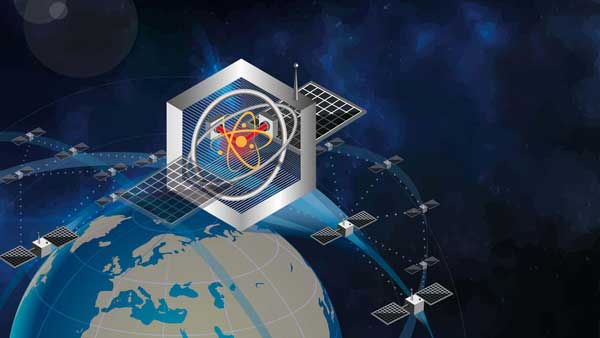
- The Galileo Competence Center is responsible for space-related aspects in the project.
- The first satellite controlled with quantum technology is scheduled for launch in 2027.
COLOGNE, Germany (DLR PR) — The quantum technology start-ups Q.ANT, Bosch, and TRUMPF CARD and the German Aerospace Center (DLR) have entered into a partnership to develop position sensors suitable for use in space. With the help of these sensors based on quantum technology, it should be possible to precisely align mini-satellites and improve global data communication. The planned quantum- based gyroscope (QYRO) should be an alternative to current mechanical gyroscopes.
The Galileo Competence Center at DLR is responsible for all space-related aspects of the project. It supports the partners in defining the space requirements for the QYRO payload and implementing them in such a way that the gyroscope can be built for space. On the other hand, the Galileo Competence Center is responsible for the definition, planning and implementation of the satellite mission. This is done in cooperation with other DLR institutes. The DLR Institute for Software Technology, the DLR Institute for Communications and Navigation and DLR Space Operations are involved.
The QYRO payload will be validated under real operating conditions in space. “This part of the project will provide the results on the question of whether QYRO, and thus quantum-based gyroscopes in general, are suitable for space and, if so, how they compare to commercially available, modern reference systems,” explains Harald Hofmann from the Galileo Competence Center in Oberpfaffenhofen. DLR wants to launch the first mini-satellite with quantum technology in five years’ time. Position sensors using quantum effects can be used not only for satellites, but also for automated driving or indoor navigation, for example in factory and logistics halls.
Partnership between industry and research
The development of European quantum sensors should strengthen independence from the world market. Q.ANT leads the development partnership. “This strategic partnership shows the potential in the joint development of future technologies. The use of quantum technology in aerospace is a huge opportunity for Germany as an industrial location,” says Michael Förtsch, CEO of Q.ANT. The start-up assembles the various components of the sensor and supplies the detection unit. Bosch research is developing a miniaturized measuring cell suitable for use in space. It is filled with an atomic gas, which is stimulated by laser beams and magnetic fields to cause the atoms to rotate. Miniature laser diodes from TRUMPF are used together with the Ferdinand Braun Institute, Leibniz Institute for High Frequency Technology, developed for use in quantum technology and in space. They are then integrated into the housing with additional measurement technology.
To the project
That Federal Ministry of Education and Research (BMBF) is funding the joint project QYRO as part of the funding measure “Lighthouse projects of quantum-based measurement technology to meet societal challenges”. The research budget for the project is around 28 million euros, a large part of which comes from the BMBF.
The Galileo Competence Center
The Galileo Competence Center at the DLR site in Oberpfaffenhofen was founded in 2019. One of the main tasks is the technical implementation and demonstration of sustainable concepts and technologies for European satellite navigation. Another focus is the use and promotion of quantum technologies. With its expertise, the competence center is a contact for politics, research, industry, the European Commission and other partners.

